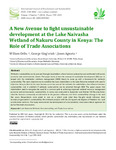A New Avenue to fight unsustainable development at the Lake Naivasha Wetland of Nakuru County in Kenya: The Role of Trade Associations

View/
Date
2014Author
Oribu, William
King’oriah, George
Agwata, Jones F.
Metadata
Show full item recordAbstract
Wetlands sustainability can be pursued through stakeholders where business enterprises are confronted with social,
economic and environmental claims. This paper looks at how the concept of sustainable development (SD) can be
looped with the stakeholder relations management (SRM) theory to come up with a framework for wetlands
sustainability. The main objective was to establish the main stakeholders in the Lake Naivasha wetland with specific
objectives being to identify the main business activities around the wetland; the stakeholders that influence business
sustainability; and to establish if wetlands sustainability can be achieved through SRM. The paper argues that
stakeholders need to recognize the need for a common path to achieving improved wetland resource management
economic and environmental sustainability. A survey was conducted in September and October 2013to establishes
what the business community considered to be the greatest influence over their sustainability strategy in the next
five years. Respondents were asked to rate on a Likert scale what they thought would influence their
business/organization’s sustainability. Discriminant analysis with the chi-square and degrees of freedom was used
as inferential statistics. The study recommends the development of a Sustainability Assessment Model signature for
each of the trade associations.
